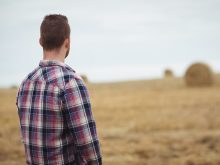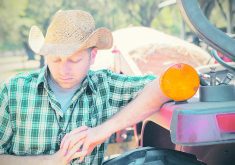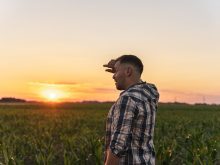Do More Agriculture Foundation offers programs such as Mental Health First Aid, In the Know and Talk, Ask, Listen
Applications for the Do More Agriculture Foundation’s Community Fund are now open and available for organizations looking to bring mental health education and training to their neighbourhood.
Megz Reynolds, executive director of the foundation, said mental health programs such as Mental Health First Aid, In the Know, and Talk, Ask, Listen could help address struggles faced by those in the agricultural sector.
“Those are three of the courses that can be brought into communities across Canada,” she said. “As well, we’re going to be running virtual courses across Canada that are shorter in length but are geared towards getting mental health information and literacy out there but creating community at the same time.”
Read Also

Know what costs are involved in keeping crops in the bin
When you’re looking at full bins and rising calf prices, the human reflex is to hold on and hope for more. That’s not a plan. It’s a bet. Storage has a price tag.
The program is supported by Farm Credit Canada.
Applicant communities can pick which programs are most applicable to what works for and fits best with the community. Those looking to apply for the program can come from a range of groups, including a rural municipality, producer organization or mental health advocate.
“We then work with that community leader to make sure (the program) gets set up, and through FCC, we’ll be taking care of the cost,” said Reynolds.
The aftereffects of the COVID pandemic, continued stresses brought on by weather-related pressure on farms and ranches, as well as challenges with inflation, are all adding to the need to address mental health.
“There is a greater need than there has been in the past,” said Reynolds. “There has always been that need and through education and awareness we learned to support ourselves, support others of the stigma that is there surrounding reaching out for help.”
Even as the weight of public health restrictions eased at the beginning of 2022, there was little space for producers to catch their breath as geo-political circumstances brought on another level of stress, said Reynolds.
“It felt like we were coming out of a dark tunnel and there was a light at the end coming out of the pandemic,” she said. “Then Russia invaded Ukraine and fuel prices spiked, fertilizer prices spiked right at seeding so that came with its own set of challenges.”
Poultry producers were also hit across the country with avian influenza, which saw whole flocks decimated. That added to the impacts to producers’ mental well-being, added Reynolds.
“There is more need than ever,” she said, highlighting a recent University of Guelph study of those in the ag sector that shows one in four producers “felt that their life was not worth living, wished that they were dead or had contemplated taking their own life in the last 12 months.”
Reynolds commented that in 2021, “that’s the state of Canadian agriculture.”
The continued shocks to the ag sector, which appear to become more regular and impactful, make it difficult to discern whether mental health of farmers and ranchers will improve in the near future, said Reynolds.
“Those shocks to the system that used to be that once-in-a-100-year event, that’s happening more often and we’re living in this state of whack-a-mole of what’s happening and what’s going to happen next,” she said. “I think it is hard to move out of that state without working on some of those (mental health) aspects.”
Applications for Do More Ag’s Community Fund can be accessed until Dec. 10 by visiting the foundation’s website at Community Fund — The Do More Agriculture Foundation.
















